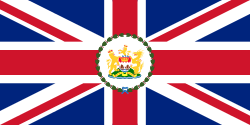Robert Black (colonial administrator)
| Sir Robert Black GCMG OBE | |
|---|---|
 | |
| 23rd Governor of Hong Kong | |
|
In office 23 January 1958 – 31 March 1964 | |
| Preceded by | Edgeworth Beresford David (Administrator) |
| Succeeded by | Edmund Brinsley Teesdale (Administrator) |
| 5th Governor of Singapore | |
|
In office 30 June 1955 – 9 December 1957 | |
| Preceded by | Sir William Goode |
| Succeeded by | Sir William Goode |
| Personal details | |
| Born |
3 June 1906 Edinburgh, Scotland |
| Died |
29 October 1999 (aged 93) Berkshire, Scotland |
| Profession | colonial administrator |
Sir Robert 'Robin' Brown Black GCMG OBE (Chinese: 柏立基, 3 June 1906 – 29 October 1999) was a British colonial administrator. Born in Edinburgh and educated at George Watson's College and the University of Edinburgh, he would spend three decades overseas and return to Britain in the 1960s. He was Governor of Hong Kong from 23 January 1958 to 1 April 1964, having been Colonial Secretary of Hong Kong from 1952 – 1955. He served as Governor of Singapore from 1955 to 1957.
Colonial administration career
Sir Robert Brown Black served in the administration of Britain's colonies for more than 30 years. Entering the colonial service, Black was assigned to Trinidad, but the remainder of his postings were in Asia.
During his posting in North Borneo Black was commissioned into the Intelligence Corps and involved in guerilla resistance against the Japanese. He was captured in 1942 and spent the remainder of World War II in a Japanese prisoner-of-war camp.
After the war ended, he returned to the colonial service and served in North Borneo and Hong Kong before moving on to Singapore as Governor (1955–57). Subsequently, he became Governor of Hong Kong from 1958 to 1964.
During his governorship, Hong Kong became increasingly prosperous. At the same time, many tens of thousands of refugees were illegally crossing the border from China every year, driven in part by widespread famine in China during the years 1958 - 61. Some were stopped and sent back, but almost all of the hundreds of thousands who reached Kowloon were allowed to stay. This influx placed an enormous burden on the colonial authorities, but the needs of the refugees were met by a program of housing construction and public health measures.
Hong Kong experienced a prolonged drought of unanticipated severity during the last two years of his tenure, which led to a serious water shortage. Water rationing was imposed in May 1962 and continued through August 1964. From June 1963 until late May 1964 (when the arrival of Typhoon Viola ended the drought) the water supply was restricted to a single 4-hour period every 4 days.
Black helped establish the Chinese University of Hong Kong by uniting several smaller institutions.[1] He served as Chancellor of both the Chinese University of Hong Kong and the University of Hong Kong during his tenure as Governor of Hong Kong.
He was knighted (KCMG) in 1955 and promoted to GCMG in 1962.
Post-governorship
Black returned to Britain in 1964.[2] He was active with the Commonwealth War Graves Commission and the Royal Commonwealth Society, and served as chairman of the Clerical Medical and General Life Assurance Society in the 1970s. He died on 29 October 1999, having been predeceased some years earlier (in 1986) by his wife Anne. He was survived by their two daughters, Barbara and Kathryn.[1]
Tributes
- Robert Black College, a graduate college of the University of Hong Kong.
- Robert Black Health Centre in San Po Kong, Hong Kong.
- Sir Robert Black College of Education, now merged into the Hong Kong Institute of Education.
See also
Notes
- 1 2 Sir Robert BlackTough Scot sorting out the end of Britain's empire
- ↑ Hong Kong, Report for the Year 1963. Hong Kong Government Press. 1964.
| Government offices | ||
|---|---|---|
| Preceded by Sir John Fearns Nicoll |
Colonial Secretary of Hong Kong 1952–1954 |
Succeeded by Sir Edgeworth Beresford David |
| Preceded by Sir John Fearns Nicoll |
Governor of Singapore 1955–1957 |
Succeeded by Sir William Allmond Codrington Goode |
| Preceded by Sir Alexander Grantham |
Governor of Hong Kong 1958–1964 |
Succeeded by Sir David Trench |
